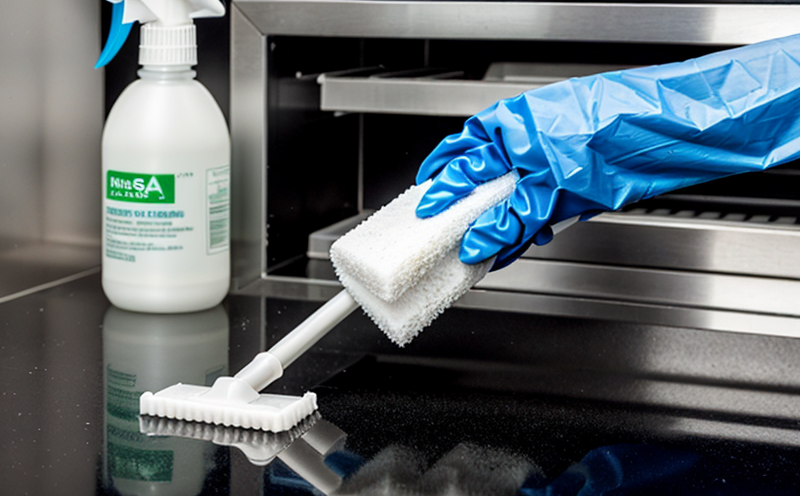DIN EN 14561 Antimicrobial Resistance Testing of Plastic Cleaning Surfaces
The DIN EN 14561 standard is a crucial guideline for ensuring the effectiveness and safety of antimicrobial plastic cleaning surfaces used in various sectors, including healthcare, food processing, and general hygiene. This test evaluates whether plastic materials can effectively inhibit or kill microorganisms without causing resistance issues that could compromise their efficacy over time. The procedure involves exposing cleaned plastic samples to different types of bacteria under controlled conditions before assessing the reduction levels post-treatment.
The primary goal is to determine if the specified plastic material maintains its antimicrobial properties consistently across multiple cycles of cleaning and drying, thereby preventing potential resistance development. This ensures that the surface remains effective in maintaining a hygienic environment over extended periods without compromising on safety standards.
For instance, hospitals often rely heavily on such surfaces to minimize cross-contamination risks during patient care activities. By adhering strictly to DIN EN 14561 guidelines, manufacturers can assure healthcare facilities that their products meet stringent hygiene requirements and contribute positively towards infection control efforts.
The testing process typically includes several steps aimed at replicating real-world usage scenarios as closely as possible. Specimens are prepared according to specified dimensions and then subjected to standardized cleaning protocols followed by exposure to various strains of bacteria. Post-treatment, the samples undergo microbiological analysis to quantify reductions in microbial counts compared to initial levels.
This approach not only assesses immediate effectiveness but also helps identify any trends indicative of emerging resistance patterns which could inform future product improvements or modifications if necessary. Additionally, it allows for continuous monitoring and validation of production processes ensuring consistent quality outputs.
Understanding the underlying mechanisms behind antimicrobial resistance is essential when interpreting results from DIN EN 14561 tests. Factors like material composition, surface texture, porosity, and mechanical properties play significant roles in determining how well a particular plastic will perform against microorganisms. Therefore, selecting appropriate specimens for testing based on these characteristics ensures more accurate evaluations of actual performance under realistic conditions.
By incorporating DIN EN 14561 into their quality assurance programs, organizations demonstrate commitment to producing reliable, high-performance cleaning solutions that enhance overall hygiene standards within targeted environments.
Applied Standards
| Standard | Description |
|---|---|
| DIN EN 14561 | This European standard specifies the methods for testing plastic cleaning surfaces in terms of their ability to inhibit or kill microorganisms while avoiding resistance development. It covers various aspects including specimen preparation, exposure conditions, and post-treatment analysis. |
| ISO 20743:2015 | An international standard addressing the microbiological safety of medical devices intended for use in healthcare settings. Although focused on medical applications rather than cleaning surfaces per se, it provides complementary insights into ensuring safe and effective antimicrobial performance. |
| ASTM E2846-19a | A North American standard providing additional guidance on testing antimicrobial efficacy through standardized protocols. While not directly applicable to DIN EN 14561, it offers valuable supplementary information for comprehensive evaluations. |
The combination of these standards ensures a robust framework encompassing both local and international best practices, ultimately contributing to the development of reliable testing methodologies.
Eurolab Advantages
At Eurolab, we pride ourselves on delivering comprehensive, cutting-edge services tailored specifically towards meeting your unique needs. Our team of experienced professionals brings together expertise from diverse backgrounds encompassing chemistry, biology, engineering, and materials science to provide robust support throughout every stage of the testing process.
- Accurate Specimen Preparation: Ensuring precision in specimen preparation is crucial for accurate test results. Our skilled technicians follow stringent protocols to prepare samples according to DIN EN 14561 specifications, ensuring consistency across all tests.
- State-of-the-Art Equipment: Leveraging advanced analytical instruments allows us to conduct precise measurements and analyses necessary for evaluating antimicrobial resistance effectively. This includes sophisticated microbiological assays capable of detecting even minimal changes in microbial populations.
- Comprehensive Reporting: Providing detailed reports that not only summarize findings but also offer actionable insights based on our interpretations. These reports help clients make informed decisions regarding product development, compliance verification, or process optimization efforts.
We understand the importance of adhering strictly to specified standards like DIN EN 14561 when performing these types of tests. Our commitment to accuracy and reliability ensures that you receive results that can be confidently relied upon across different sectors.
Quality and Reliability Assurance
- Strict Adherence to Standards: All our testing procedures follow international standards such as DIN EN 14561, ISO 20743:2015, and ASTM E2846-19a meticulously. This guarantees that the results obtained are consistent and comparable globally.
- Regular Calibration: Our instruments undergo regular calibration checks to ensure they remain accurate throughout their operational lifetimes. This minimizes measurement errors and enhances the reliability of our findings.
- Inhouse Reference Materials: Utilizing in-house reference materials allows us to validate test results consistently against established benchmarks, further enhancing confidence in our outputs.
- Inter-Laboratory Comparisons: Participating in inter-laboratory comparisons helps maintain high standards of performance and ensures that our laboratory remains competitive within the global market.
These measures collectively contribute to maintaining a high level of trustworthiness among clients who depend on us for critical testing services.





